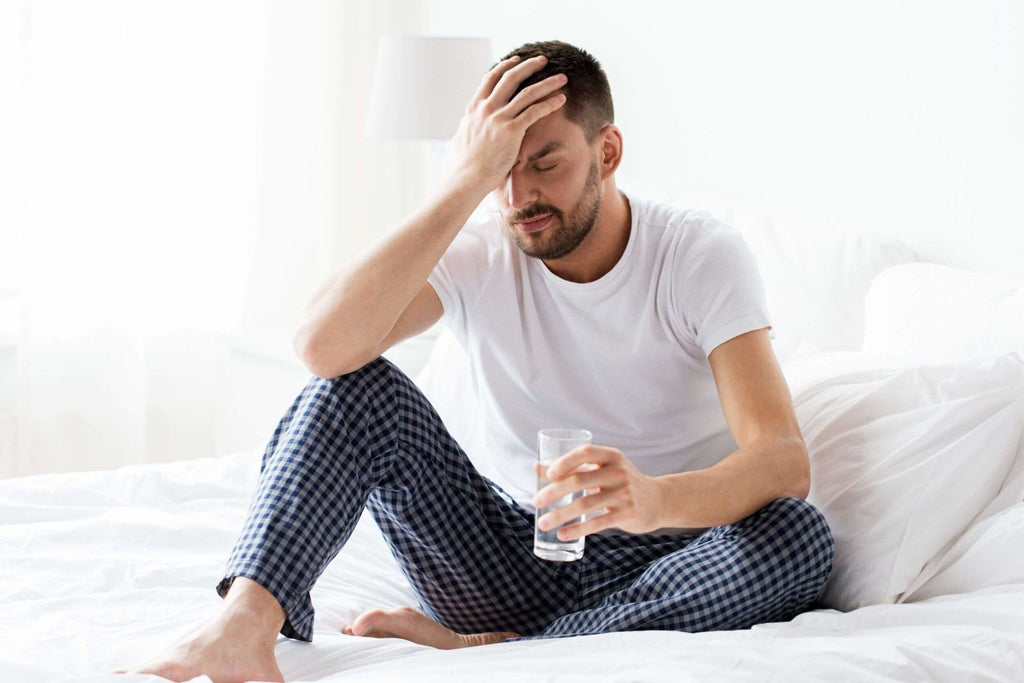Sleeping Off a Hangover: The Best Recovery

People suffering from the ill effects of a hangover are often easy to spot. They’re the ones wearing sunglasses inside, moving at a snail’s pace, and wincing at whispers as though they were steel drums being beaten with hammers a mere two inches from their sensitive ears. If you’re one of these hangover sufferers, there’s only one thing on your mind at the moment. You'd like to be able to get a good night's sleep. You want relief. And the faster the better.
Sleeping Off a Hangover
For many people in your predicament, sleeping off a hangover by getting a good night's rest sounds like the best possible solution. In fact, it’s often the recommended solution of choice. Your body needs time to recalibrate itself and recover. Sleep provides that time, and allows your body to do these things more efficiently. A lack of sleep and sleep deprivation will only compound the problem. Here are a few other things you should keep in mind that might help you avoid the worst damage a hangover can do.
Can You Sleep Off a Hangover?
Symptoms of a hangover can vary from person to person, but commonly include a headache, nausea, dehydration, fatigue, and sensitivity to light and sound. Many people try to alleviate their hangover symptoms by getting some sleep, but can you really sleep off a hangover?
The short answer is no, sleeping off a hangover is not a guaranteed cure. Although getting some rest can help alleviate some symptoms, it won't necessarily make your hangover disappear completely. Here's why.
Firstly, alcohol disrupts your circadian rhythm. While you may fall asleep easily after a night of drinking, your sleep quality is likely to be poor. Alcohol reduces the amount of REM (rapid eye movement) sleep you get, which is the stage of sleep where dreaming occurs, and is essential for proper restorative sleep. Poor sleep quality can contribute to feelings of fatigue, and exacerbate other hangover symptoms, such as headaches and irritability.
Secondly, alcohol dehydrates you, and dehydration can lead to some of the most unpleasant hangover symptoms such as headaches, dizziness, and nausea. Even if you manage to sleep for a few hours, you may still wake up feeling thirsty, and with a pounding headache. Drinking water before bed and throughout the day can help alleviate these symptoms, and promote rehydration.
Thirdly, the metabolism of alcohol in your body produces a byproduct called acetaldehyde, which can cause some of the symptoms associated with a hangover. The liver typically metabolizes acetaldehyde, but this process can take time. If you sleep for a few hours, your liver will continue to work on metabolizing the alcohol and acetaldehyde, but you may still wake up with some residual symptoms.
So, while sleeping can help alleviate some symptoms of a hangover, it is not a guaranteed cure. Follow the below principles and practices for better results.
Practice Prevention
Prevention is the best cure for many things in life. If you have a major celebration planned or know you’re going to be drinking alcohol, it’s a good idea to plan ahead and take a few steps, at least according to Prevention magazine, to prevent the misery that often follows a light night of drink and dance.
Eat a Healthy Meal Beforehand
Eat foods that will remain in your stomach longer such as high-fiber or fatty foods so that you’re not adding alcohol to an already empty stomach.
Replace Electrolytes
When you get home by drinking a sports drink, like Gatorade.
Drink Water Throughout the Evening
Mixing water with your alcohol allows your body a little recovery time between drinks, and gives you something else to help flush the alcohol from your system throughout the evening.
Recovering from Hangovers
These steps may not sound very exciting, but when you’re in the throes of a hangover, you don’t really need exciting. They are, however, believed to be effective, and that’s the most important thing about hangover remedies.
Drink Plenty of Water
This will make you need to relieve yourself in other ways more frequently, which will in turn flush the alcohol from your system more rapidly.
Eat Asparagus
While asparagus might not make your top ten list of midnight munchies of choice to go along with your evening on the town, it should be part of your hangover recovery process, according to this recent article in U.S. News & World Report. Who knew that asparagus not only helps alleviate many hangover symptoms, but it also acts as a diuretic that will remove even more alcohol from your system?
Take an Over-the-Counter Pain Reliever
Like ibuprofen, reports the Mayo Clinic. Acetaminophen when coupled with excessive amounts of alcohol can cause permanent liver damage and aspirin can irritate an already weak stomach. Ibuprofen is a widely available over the counter pain reliever that isn’t, at this time, associated with negative side effects when treating hangovers. Be sure that your doctor approves of you taking ibuprofen, however.
Sleeping off hangovers is often the way to go, the U.S. News & World Report goes on to say. However, for the times when you can’t simply sleep it off, the above tips should help you get back on your feet a little bit faster than trying to go it alone.
Link to Us!
If you found this article useful and shareable, please copy and paste the following into the html code of your website or blog:
Learn More About Going Green at the <a href="https://www.plushbeds.com/blogs/green-sleep/sleeping-off-a-hangover">PlushBeds Green Sleep Blog</a>.
*Please note that we DO NOT accept guest blog posts. Any inquiries into this will be respectfully left unanswered.
The post Sleeping Off a Hangover: The Best Recovery appeared first on PlushBeds Green Sleep Blog.
